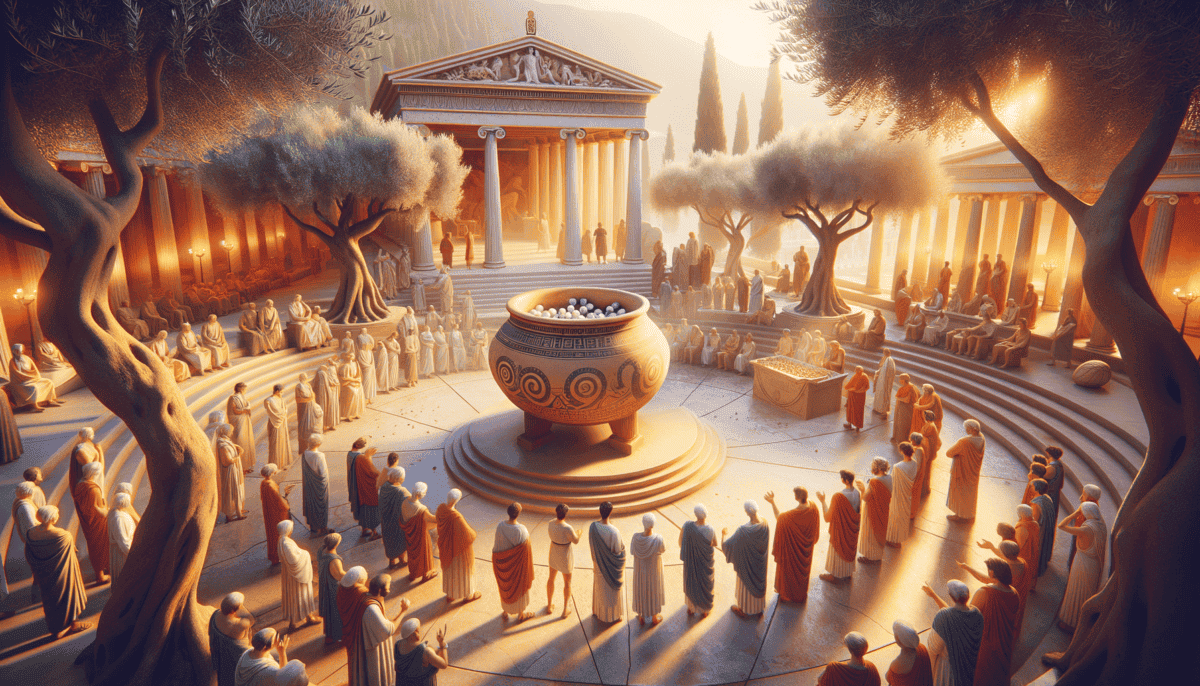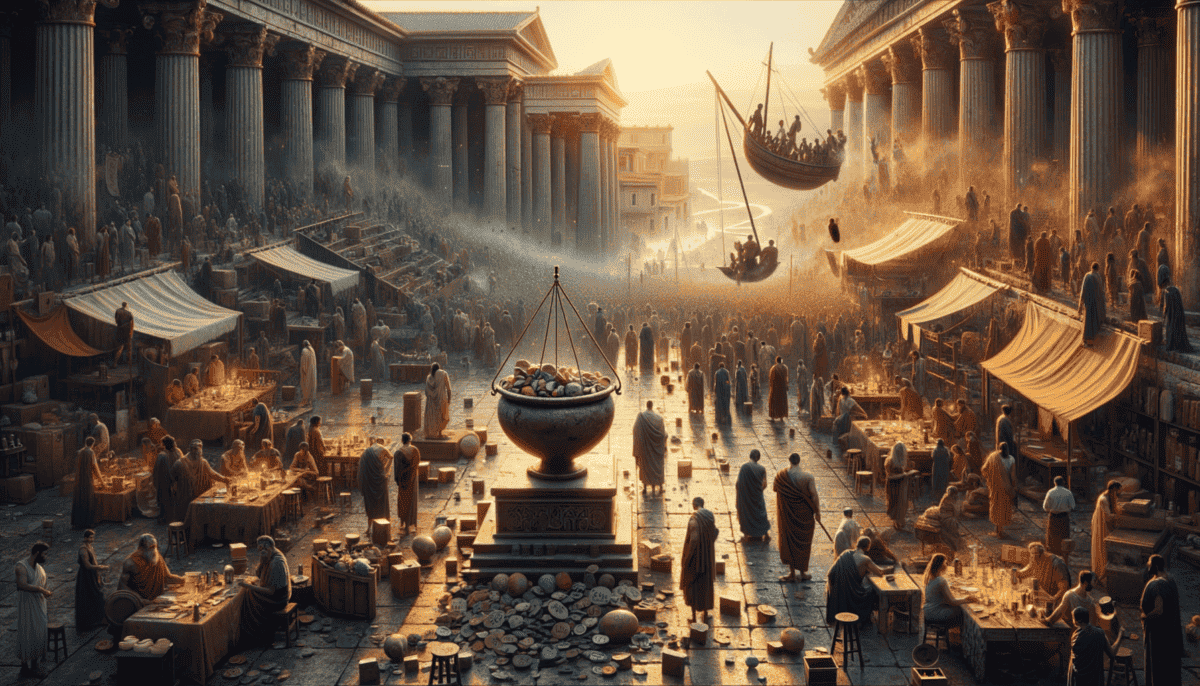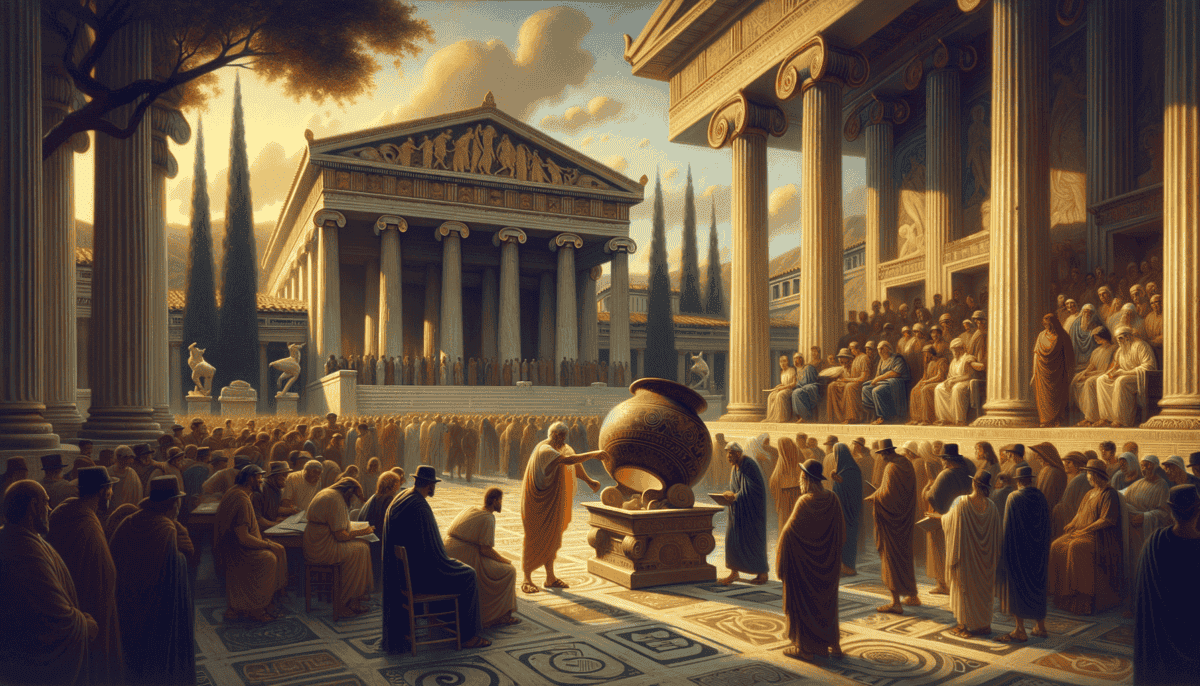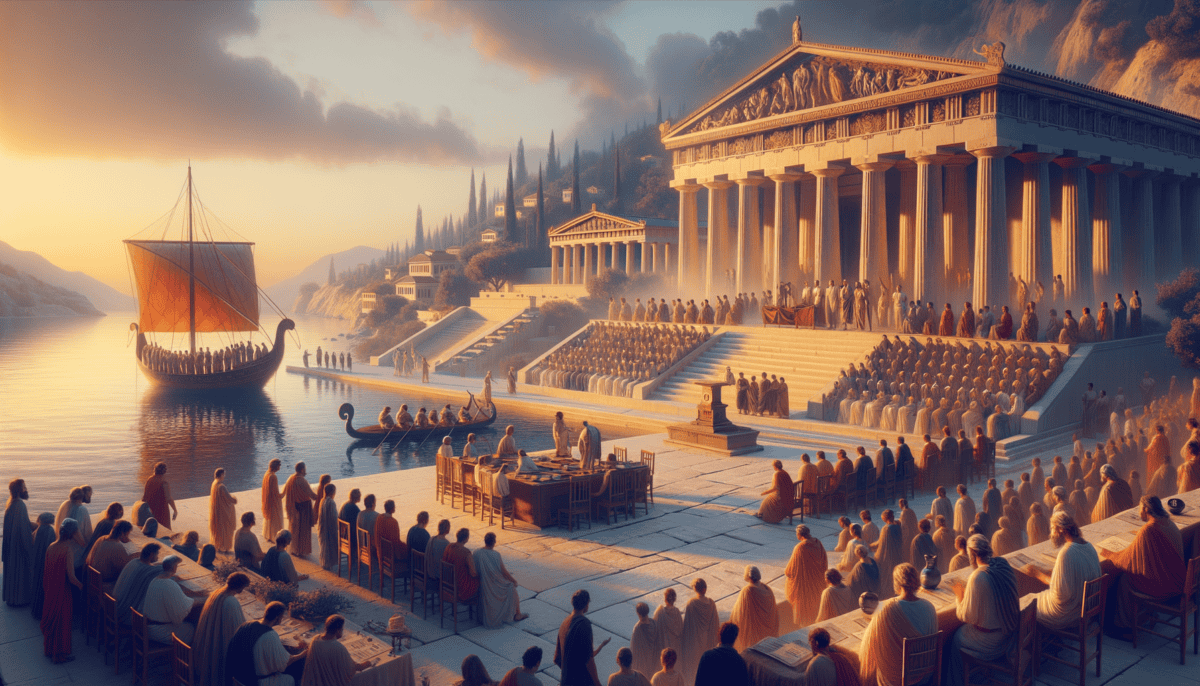The Pottery Shard Revolution
Long ago, in a city called Athens, people had a special way to protect their freedom. They used broken pieces of pottery! This might sound funny, but it was very important.
The sun shone brightly over the beautiful city of Athens. White marble buildings sparkled, and people walked through busy streets filled with the smell of fresh bread and olive oil.
Little Theo walked with his father through the marketplace. He looked up at the tall columns and asked, "Father, why are those people arguing so loudly?"
His father smiled. "They're talking about how to run our city, my son. In Athens, we all help make decisions. It's called democracy."
But there was a problem in Athens. Sometimes, leaders became too powerful. They tried to take control of everything! The people needed a way to stop this from happening.
"What if someone gets too bossy?" Theo asked.
"Ah!" his father's eyes twinkled. "That's where our clever solution comes in. We use broken pieces of pottery called 'ostraka' to vote. If too many people think a leader is becoming dangerous, we can ask them to leave the city for ten years!"
How the Pottery Pieces Worked
The process was simple:
• Citizens would write the name of a powerful person they worried about
• If 6,000 people voted, and most picked the same person
• That person had to leave Athens for 10 years
"But isn't that mean?" Theo wondered.
"It's better than fighting," his father explained. "This way, we solve problems peacefully. The person can even come back after their time is up!"
In the busy marketplace, people gathered in small groups. They talked about their leaders and shared their hopes for Athens. Everyone had a voice, from the richest merchant to the poorest farmer.
As the sun began to set, casting long shadows across the Agora (the main square), Theo realized something important. In Athens, power didn't belong to just one person. It belonged to everyone.
"Father," he said proudly, "when I grow up, I want to help make decisions for our city too!"
His father laughed and ruffled his hair. "You will, my son. That's the beauty of Athens – everyone has a chance to make their voice heard."
The broken pottery pieces weren't just trash. They were tools that helped keep Athens free. They showed that sometimes the simplest things can solve the biggest problems.
People in Athens knew that power could be dangerous. But with their clever pottery system, they found a peaceful way to protect their city. It wasn't perfect, but it was better than fighting or letting someone become too powerful.
“Remember, Theo,” his father said as they walked home, “in Athens, we don’t need swords to fix our problems. Sometimes, all we need is a piece of broken pottery and the wisdom to use it well.”
The streets grew quiet as evening approached. But the ideas of democracy and fairness that Athens created would echo through time for thousands of years to come.
The Agora’s Secret Weapon
The sun rose over Athens, casting golden light on the bustling Agora. Today was special – it was voting day! ️ People filled the square, carrying small pieces of pottery in their hands.
“Look at all the people!” little Marina said to her mother. They watched as hundreds of citizens gathered in the morning light.
“How does the voting work, mama?” Marina asked, watching people scratch names onto pottery pieces.
Her mother smiled and picked up a broken piece of pottery. “It’s quite simple, dear. We call these pieces ‘ostraka.’ Each person writes down the name of someone they think has gotten too powerful.”
The Big Vote
The voting process was special. Here’s how it worked:
• First, people gathered in the Agora
• Then, they wrote a name on their pottery piece
• Next, they dropped their piece in a special counting area
• Finally, officials counted all the votes
The air buzzed with excitement. Some people talked in whispers, while others spoke loudly about their choices.
“But how do they count so many pieces?” Marina wondered.
“We have special counters who sort through all the pieces,” her mother explained. “If more than 6,000 people vote, and most pick the same person, that person must leave Athens for ten years!”
Two men nearby were talking loudly:
“I’m voting for Aristides,” said one man. “He’s getting too powerful!”
“But he’s a good leader!” argued the other.
Marina’s mother squeezed her hand. “See? Everyone has different ideas about what’s best for Athens. That’s why we vote – to let everyone have a say.”
The Counting Begins
As the sun climbed higher, officials began counting the pottery pieces. They worked carefully, making piles for each name.
The crowd grew quiet, waiting to hear the results. Would anyone be asked to leave Athens today?
“What happens to the person who has to leave?” Marina asked.
“They must go live in another city,” her mother explained. “But they can keep their money and property. And after ten years, they can come back home.”
As evening approached, more and more people gathered to hear the results. Some looked worried, others hopeful.
“Remember, Marina,” her mother said softly, “this isn’t about being mean. It’s about keeping our city safe and fair. Sometimes, asking one person to leave for a while is better than letting them become too powerful.”
The little girl nodded, understanding. Athens had found a peaceful way to solve big problems. No fighting, no violence – just simple pieces of pottery and the wisdom of its people.
Marina picked up a broken piece of pottery from the ground. In her young hands, she held part of Athens’ secret weapon – not a sword or a shield, but a simple tool that helped keep democracy strong.
A Hero’s Rise and Fall
The streets of Athens buzzed with talk of one name: Themistocles! He was a brave leader who helped save Athens in big battles.
“Tell us about the great ships again!” young Pericles begged his grandfather in the marketplace. Many children gathered around to listen.
The Smart Commander
The old man smiled and began, “Themistocles was very clever. He told Athens to build lots of ships. When bad guys came to fight, we were ready!”
“He saved us from the Persian army,” another child added excitedly.
“Yes, but sometimes being too good at something makes other people worried,” the grandfather said quietly.
Growing Worries
Not everyone liked how powerful Themistocles was getting. Some people started saying mean things about him:
• "He thinks he's better than everyone else!"
• "He's getting too rich!"
• "He makes choices without asking others!"
“But grandfather,” little Pericles said, “didn’t he make Athens safe?”
“Yes, child. But in Athens, we believe no one should become too powerful – even heroes.”
Friends Turn Away
More and more people started to worry. Even Themistocles’ old friends didn’t want to be seen with him anymore.
At parties, people would move away when he came near. In the marketplace, some shops wouldn’t sell to him.
“What’s happening to our hero?” Pericles asked sadly.
The Big Choice
Soon, people started talking about using their special pottery pieces – the ostraka. They wanted to vote about Themistocles.
“But he helped us!” some people said.
“Yes, but now he’s too strong,” others answered. “We need to keep Athens safe.”
The children watched as grown-ups argued in the streets. Some people cried. Others looked angry.
“Remember,” the grandfather said to the children, “Athens belongs to all of us, not just one person – even if that person is a hero.”
As the sun set over Athens, little Pericles looked at the big house where Themistocles lived. Would the hero who saved Athens have to leave his home? The whole city waited to find out.
People started getting their pottery pieces ready. Soon, they would all meet in the Agora to make a very big decision about their very famous hero.
Democracy in Action
The sun rose over Athens on voting day. Thousands of people walked to the Agora – the big meeting place. Everyone held small pieces of pottery called ostraka.
The Morning Buzz
Little Pericles watched from a corner as people filled the square. Some looked sad, others looked mad.
“Papa, why are some people crying?” Pericles asked his father.
“Because choosing between what’s right and what’s easy is hard, son.”
Voting Time
The morning sun got hotter as more people came. Soon, there were over 6,000 people! That’s as many as ten big schools full of kids.
“Each person gets one vote,” explained the leaders. “Scratch the name of who you want to send away on your pottery piece.”
Here’s what people needed to do:
• Get their pottery piece ready
• Write down one name
• Drop it in the big pot
• Wait for counting
Different Voices
An old farmer stepped forward. “Themistocles saved us! How can we send him away?”
A merchant shouted back, “He’s getting too powerful! We must protect our city!”
The Big Count
As the sun moved across the sky, people dropped their pottery pieces in huge pots. The sound of breaking pottery filled the air as counters sorted the pieces.
Little Pericles watched the counting with wide eyes. “How many pieces do they need, Papa?”
“If 6,000 people vote against someone, that person must leave Athens for ten years.”
Waiting Game
The counting took hours. People stayed in the Agora, waiting to hear what would happen. Some shared food. Others told stories about Themistocles.
As the sun started to set, a loud horn blew. Everyone got quiet. The results were ready!
The head counter stood up tall. He held up his hands. The whole city seemed to hold its breath.
“After counting all the votes…” he began.
Little Pericles squeezed his father’s hand. Would their hero have to leave? The answer would change Athens forever.
The Price of Power
The count was done. Over 6,000 pottery pieces said the same thing – Themistocles must leave Athens.
The Last Night
Themistocles walked home slowly. The streets were quiet. People peeked through their windows but didn’t come out.
“Father, why must you go?” asked his youngest daughter, tears in her eyes.
“Sometimes, being strong makes people afraid,” he said softly. “But I will always love Athens.”
Packing Up
The law gave Themistocles ten days to leave. He could only take what he could carry.
“Remember,” he told his family, “this is not goodbye forever. Ten years will pass like a summer breeze.”
A Friend’s Visit
Little Pericles and his father visited Themistocles before he left.
“But you saved us from the bad ships!” Pericles said. “It’s not fair!”
Themistocles smiled and ruffled the boy’s hair. “Sometimes the price of being strong is being alone.”
The Journey Begins
On the tenth day, Themistocles walked through the city gates. Many people watched from far away. Some cried. Others cheered.
These are the things he took with him:
• His favorite walking stick
• Some warm clothes
• A bag of coins
• Memories of Athens
New Adventures
Themistocles traveled to many places. He made new friends. He learned new things. But his heart stayed in Athens.
He wrote letters to his family:
“Dear ones, I see beautiful things in my travels. But nothing is as beautiful as our Athens. Keep her safe for me.”
Changes in Athens
Without Themistocles, Athens changed. New leaders came forward. Some were good. Some were not so good.
Little Pericles watched all this and learned. He learned that being a leader means being ready to lose everything for what you believe in.
As the years passed, people started to wonder: Had they made the right choice? Only time would tell what this meant for Athens.
A Democracy’s Legacy
Ten years passed like waves on the shore. Athens grew and changed.
Looking Back
Pericles often thought about Themistocles. He remembered the day the hero left Athens. It taught him something important.
“Power belongs to the people,” Pericles told the crowd. “That’s what makes Athens special.”
The Pottery Pieces Speak
In the years that followed, the ostracism system changed Athens. Here’s what it did:
• Made leaders careful about their power
• Helped people feel strong
• Kept Athens free
• Taught everyone about working together
A New Way Forward
Other cities heard about Athens’ special way of voting. They wanted to try it too!
Lessons for Today
“Tell us about the old days,” children would ask their grandparents.
“We used broken pots to vote,” they would say. “It might sound funny, but it helped keep us free.”
“Sometimes the bravest thing is letting the people decide.”
The Story Lives On
Today, we still use many ideas from ancient Athens. We vote. We make decisions together. We try to be fair. ️
And somewhere, in the dust of old Athens, those pottery pieces still tell their story. They remind us that people working together can do amazing things.
Every time we vote today, we’re a little bit like those brave Athenians. We’re helping to make our world better, one choice at a time. ✨
The end of this story is really just the beginning. Because democracy – the power of the people – keeps growing and changing, just like Athens did so long ago.






